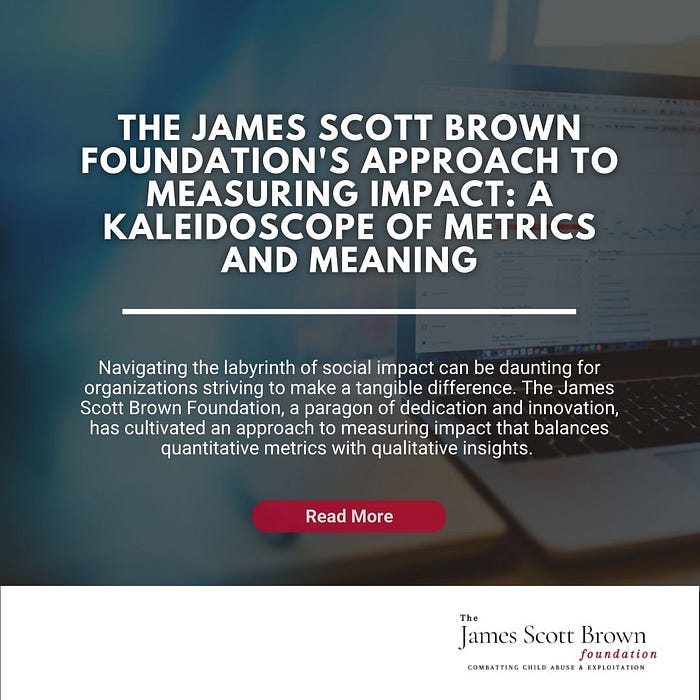The James Scott Brown Foundation’s Approach to Measuring Impact: A Kaleidoscope of Metrics and Meaning by James Scott Brown Foundation
by James Scott Brown Foundation

Navigating the labyrinth of social impact can be daunting for organizations striving to make a tangible difference. The James Scott Brown Foundation, a paragon of dedication and innovation, has cultivated an approach to measuring impact that balances quantitative metrics with qualitative insights. This article delves into the multi-faceted methodology employed by the foundation to assess its effectiveness in the battle against child exploitation.
1.Numbers that Speak: Quantitative Metrics
In the realm of impact measurement, data serves as a compass guiding the James Scott Brown Foundation’s strategic decisions. Quantitative metrics, including the number of children rescued, rehabilitation programs initiated, and awareness campaigns launched, provide a snapshot of the foundation’s achievements. Additionally, monitoring financial indicators, such as funds raised and resources allocated, ensures fiscal accountability and transparency.
2. Stories that Matter: Qualitative Insights
Beyond the realm of numbers, the James Scott Brown Foundation recognizes the power of stories to illuminate the true essence of impact. By capturing the voices and experiences of rescued children, caregivers, and communities, the foundation gains invaluable insights into the effectiveness of its interventions. These narratives weave a tapestry of transformation, showcasing the ripple effect of the foundation’s work on individual lives and society as a whole.
3. A Dynamic Duo: Short-term and Long-term Impact Assessments
The James Scott Brown Foundation’s approach to measuring impact embraces a dual lens, considering both short-term outcomes and long-term systemic change. While short-term assessments focus on immediate results, such as the number of children removed from exploitative situations, long-term evaluations delve into the enduring effects of the foundation’s initiatives on policy, societal norms, and the lives of survivors.
4. Feedback Loops: Continuous Learning and Improvement
In the quest for greater impact, the James Scott Brown Foundation fosters a culture of continuous learning and improvement. By collecting feedback from stakeholders and analyzing program performance, the foundation identifies areas of strength and opportunities for growth. This iterative process allows for the refinement of strategies and the nurturing of innovation, all in pursuit of more effective solutions to combat child exploitation.
5. Partnerships for Progress: Collaborative Impact Measurement
Collaboration is woven into the very fabric of the James Scott Brown Foundation’s impact measurement approach. By partnering with think tanks, NGOs, and research institutions, the foundation leverages diverse expertise and methodologies to bolster its understanding of impact. This spirit of collaboration fosters the sharing of best practices, insights, and lessons learned, elevating the entire field’s ability to address the complex issue of child exploitation.
In Conclusion: The Alchemy of Impact — A Symphony of Metrics and Meaning
The James Scott Brown Foundation’s approach to measuring impact is akin to a symphony, harmonizing the notes of quantitative data with the melodies of qualitative insights, all playing in concert to reveal the transformative power of the foundation’s work. By embracing this multi-dimensional methodology, the foundation ensures that its efforts are rooted in evidence and fueled by a relentless commitment to creating a safer, more just world for children everywhere.
Read more at the James Scott Brown Foundation.
Comments
Post a Comment